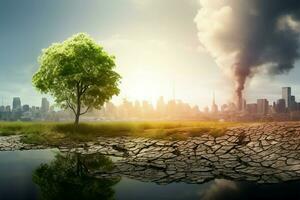Delve into the intricate web of factors driving climate change in India, as we unravel the interconnected forces shaping our planet’s future. This article offers insights into the specific contributors to climate change within India’s context, shedding light on issues that resonate with the 25-35-year-old audience.
Climate change is a global phenomenon, but its impacts are felt differently in various regions, including India. Several factors contribute to climate change within the Indian subcontinent, exacerbating environmental challenges and affecting millions of lives.
One of the primary causes of climate change in India is the burning of fossil fuels for energy production, transportation, and industrial activities. The reliance on coal, oil, and natural gas as primary energy sources has led to a significant increase in greenhouse gas emissions, contributing to global warming and climate instability.
Deforestation and land-use change also play a crucial role in driving climate change in India. The clearing of forests for agriculture, urbanization, and infrastructure development not only reduces carbon sequestration but also disrupts local ecosystems, leading to biodiversity loss and soil degradation.


Furthermore, agricultural practices, such as excessive use of fertilizers, pesticides, and inefficient irrigation techniques, contribute to greenhouse gas emissions and soil degradation, exacerbating climate change impacts on food security and rural livelihoods.
Industrial pollution and waste management practices further compound the problem, releasing pollutants and toxins into the atmosphere, water bodies, and soil, leading to environmental pollution and health hazards for communities across India.
Rapid urbanization and population growth also strain natural resources and infrastructure, leading to increased energy consumption, waste generation, and pollution levels, exacerbating climate change impacts on urban areas and vulnerable populations.
In conclusion, climate change in India is driven by a complex interplay of factors, including fossil fuel dependency, deforestation, unsustainable land-use practices, agricultural intensification, industrial pollution, and urbanization. Addressing these root causes requires concerted efforts from government, industry, civil society, and individuals to transition to sustainable and resilient pathways for development.
#ClimateChangeIndia #FossilFuelDependency #Deforestation #AgriculturalPractices #IndustrialPollution #UrbanizationChallenges #SustainableDevelopmentGoals


